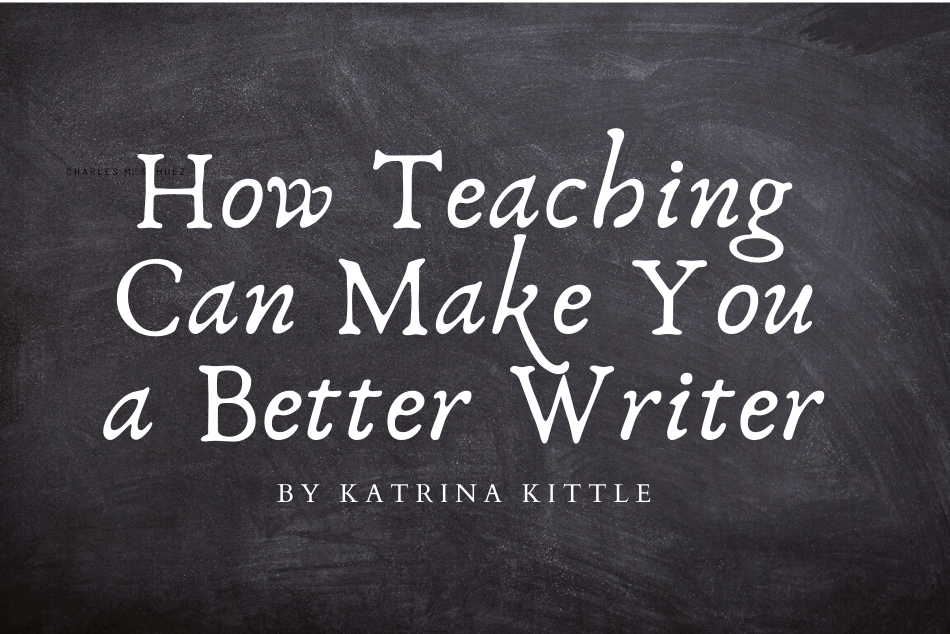by Katrina Kittle (Our Special Guest)
Last year, I took a university position as a full time Lecturer in Creative Writing after being a self-employed writer/freelancer for ten years. Some fellow writer friends thought I was nuts and worried it would kill my writing time, but many parts of the job were calling to me—and not solely the siren song of health insurance (but, I do admit, the volume on that song was pretty loud after I’d battled breast cancer twice within five years). I told myself that at the end of the first year I’d assess how it was working with my writing life. What I found surprised me.
I was happier, and a more productive and energetic writer (and human) during my year of teaching.
Considering a similar opportunity? Here’s what I discovered:
Writing can thrive on routine.
I am most productive as a writer when I must at some point in the day put on real pants and leave the house. It makes the writing time more sacred, more urgent, less likely to be postponed with social media.
Your writing self might need a community.
I have the discipline to write full time, but the disposition? Not so much, as it turns out. I have a tribe of cherished writer friends, and I could not imagine this crazy journey without them, but I missed having colleagues. My writing motto is “whatever works”—and what works for me is having students I get to know and work with for months at a time, seeing their work progress and change. What works for me is having an office in a hallway of other creative writers to commiserate and celebrate and share chocolate with. That community fuels me.
Practicing what you preach makes you a better writer.
If I’m telling students to honor a writing schedule, then I better be doing it myself. I’m not going to lie about my writing habits to young writers, so I have to walk the walk. It helps that I have the most awesome Department Chair in the world, who worked with me to create a class schedule that allowed me my mornings (time I call “the magic hours”) at home to write. If someone is giving me that respect, I better honor it.
Teaching elements of craft hones your own.
Okay, that one’s obvious. But it’s the basic tenet of all workshopping, right? Being able to articulate what’s working and what’s not in someone else’s work helps you see your own with new, objective eyes.
Being honest and vulnerable serves both students and teacher.
Students have a keen phoniness radar. Right away, I realized I had to be honest about where I was in my own writing career. I let go of the need to seem super cool or totally in control or rolling right along in a magical publishing journey. I admitted to them that after publishing five novels, I was experiencing a drought—without an agent or a contract, I was essentially starting over again. I shared with them my cancer journey, my mother’s dementia diagnosis, and the time- and energy-consuming process of moving my parents to a safer home.
I shared the creative triumph that I kept writing through it all—two complete novel manuscripts, in fact—but also the disappointment of needing a break from the publishing world—not having the bandwidth to be vulnerable professionally as well as personally during those dark days.
Now, that I’m three years cancer free and have my focus back, I’ve shared with students my query drafts and used my own rejection letters as examples of how subjective publishing can be, once showing them two very complimentary passes from agents citing exact opposite reasons. No writer creates and submits in a sheltered bubble, and no student learns the ropes in one either. With the mutual trust and rapport we’ve established, they feel more comfortable pouring themselves onto the page and voicing their achievements and frustrations alike, making the class a more authentic experience for all involved.
You receive as much as you give.
I admit I feel a little guilty about this sometimes. I know I’m a good coach, I know I help them improve their writing, but I truly feel I’m benefitting more in this scenario. The students who are on fire, who are coming up with great ideas, being productive, in love with their stories—they inspire and challenge me. I head home every day wanting to harness their energy, their “zero f*cks to give” attitudes about trying new things, experimenting, playing with words, taking risks with their stories.
Nothing fosters empathy like fiction.
Our world needs more empathy. For the past two years I’ve sought ways to “do more” to help bridge the political divisiveness in our country and to contribute in some way beyond voting, marching, and calling my congressmen. In this job, I’ve found that “more.” I love my students’ passion, their fury—they’re outraged about children in cages, gun violence, and the weakening of LGBTQ rights and environmental protections. They want to change the world. The world needs their stories. And even if these stories never find publishing homes, the world needs people who want to tell these stories.
You’ll strengthen your mission and your mantra.
During the “dark years,” I had to really grapple with “Do I really want to keep doing this?” The answer was yes. I love words and stories and transforming what’s in my head onto the page so others can see it, too—that’s one of the greatest joys in my life. I teach both the craft of fiction and the business of publishing, but encourage my young writers to remember those are two very different animals and it serves us best to keep them separate in our heads and hearts.
I share with them the quote that buoys me as I keep paddling back toward solid ground: “Promise me you will not spend so much time treading water and trying to keep your head above the waves you forget, truly forget, how much you have always loved to swim.” —Tyler Knott Gregson
Have you had a meaningful experience teaching writing—or learning from a teacher you admire? Continue the discussion on Facebook.
 Katrina Kittle is the author of four novels for adults—Traveling Light, Two Truths and a Lie, The Kindness of Strangers (winner of the 2006 Great Lakes Book Award for Fiction), and The Blessings of the Animals (all with HarperPerennial)—and one for tweens, Reasons to Be Happy (Sourcebooks). She teaches creative writing through Word’s Worth Writing Connections in the Dayton-Cincinnati area, focusing on craft and motivation (and is especially good at jumpstarting stalled writers); is a Lecturer in Creative Writing at The University of Dayton; and leads popular public “Leap and the Net Will Appear” and “Happy Class” workshops. Katrina lives in Ohio with her wonderful fella, her odd cat, their sweet rescue pocket beagle, and her out-of-control garden. She has a thing for goats, growing her own food, and going barefoot; and is obsessed with coffee, pedicures, and pollinators. She loves stories where animal characters are just as important as the human characters. Connect with her at www.facebook.com/KatrinaKittleAuthor.
Katrina Kittle is the author of four novels for adults—Traveling Light, Two Truths and a Lie, The Kindness of Strangers (winner of the 2006 Great Lakes Book Award for Fiction), and The Blessings of the Animals (all with HarperPerennial)—and one for tweens, Reasons to Be Happy (Sourcebooks). She teaches creative writing through Word’s Worth Writing Connections in the Dayton-Cincinnati area, focusing on craft and motivation (and is especially good at jumpstarting stalled writers); is a Lecturer in Creative Writing at The University of Dayton; and leads popular public “Leap and the Net Will Appear” and “Happy Class” workshops. Katrina lives in Ohio with her wonderful fella, her odd cat, their sweet rescue pocket beagle, and her out-of-control garden. She has a thing for goats, growing her own food, and going barefoot; and is obsessed with coffee, pedicures, and pollinators. She loves stories where animal characters are just as important as the human characters. Connect with her at www.facebook.com/KatrinaKittleAuthor.





